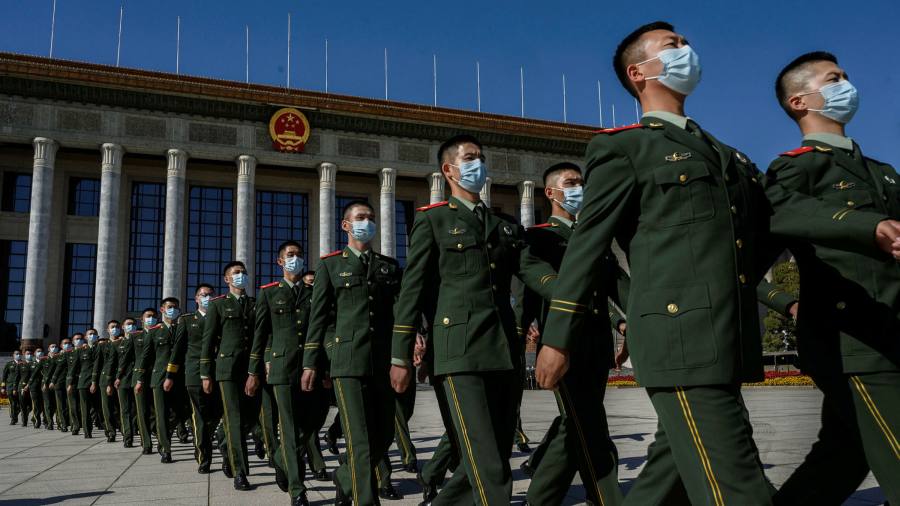[ad_1]
Late last month the EU, acting in concert with the US, UK and Canada, imposed sanctions on four obscure Chinese officials for alleged human rights violations in Xinjiang, where hundreds of thousands of Muslims have been systematically detained over recent years.
China retaliated immediately, imposing counter-sanctions on 10 European individuals, including five EU parliamentarians from five different political parties.
In doing so President Xi Jinping’s administration threatened a contentious trade deal provisionally agreed on last year between the EU and China, despite US opposition. The sanctioned parliamentarians’ parties are now reluctant to start reviewing the deal unless Xi’s counter-sanctions are lifted.
Before Beijing imposed sanctions on the EU MPs, it was expected that the European parliament would eventually ratify Xi’s geopolitical coup, which had strong backing from France’s Emmanuel Macron and Angela Merkel, the German chancellor.
But when Merkel and Xi spoke on Wednesday, China’s official account of the call did not mention the trade deal or Xinjiang.
“We had seven years of negotiations for the deal,†said Joerg Wuttke, head of the European Chamber of Commerce in China. “Now it looks like it will take another seven years.â€
The Xinjiang sanctions exchange is just the latest diplomatic dispute that Xi’s pugnacious “wolf warrior†foreign ministry officials are embroiled in. Chinese diplomats are sparring with countries and organisations that Beijing enjoyed relatively good relations with during Donald Trump’s one-term presidency. But they are expressing no regrets.
Yang Jiechi, China’s top diplomat, set the tone for Beijing’s clashes with a long lecture to his US counterpart on March 18 in Alaska, where he told Antony Blinken that no country would ever again “speak to China from a position of strengthâ€.
Victor Gao, a former Chinese diplomat who worked for Yang, said his former boss’s diatribe was “groundbreakingâ€. “Chinese leaders believe they have momentum and time is on their side,†he added. “Nothing can stop their rise.â€
Chinese state media contrasted Yang’s comments with paintings of foreign colonial powers lording it over late Qing dynasty officials, who were repeatedly humbled in a series of conflicts with European, Japanese and American enemies.
The country’s “century of humiliationâ€, according to the Chinese Communist party, ended only after its revolutionary victory in 1949.
“China today is not the China of 1840,†Xu Guixiang, a senior party official in Xinjiang, said last week. “The days of Chinese people being bullied by the west have passed. We are not an easy target any more . . . We will fight tooth for tooth until the end.â€
Many Chinese officials viewed Trump’s years in office as an unprecedented “strategic opportunity†to build bridges with Washington’s frustrated allies. But analysts said that, like Trump, those officials also believed that the Chinese Communist party could benefit domestically from diplomatic confrontations.
“Heated nationalism is good for strengthening the legitimacy and authority of the central government and [Xi],†said Yun Sun, a Chinese foreign policy expert at the Stimson Center in Washington.
“It all comes back to [Xi’s] mentality and the course he has charted,†she added, especially as the CCP prepares to celebrate the centennial of its founding in July. “The party needs to demonstrate its strength and achievements. A soft approach is not going to work.â€
Last week Beijing challenged comments by Tedros Adhanom Ghebreyesus, the World Health Organization director-general who had previously been criticised for his reluctance to confront Beijing. Tedros said that Chinese officials had withheld information from WHO experts investigating the origins of coronavirus.
“After coming under pressure from the Europeans, Canadians and Americans, Tedros didn’t want to give China a pass because that would have provoked a crisis with the west,†said a diplomat involved in the WHO’s deliberations.
“Meanwhile the Chinese had to stick to their rhetoric that ‘[Covid] is a bigger problem, we had it and we dealt with it, but now we have to look elsewhere [for its origin]. They have bats in Myanmar and Laos, too’,†the diplomat added.
“It also has to be seen in the context of what had just happened in Alaska where they said don’t lecture us and don’t talk down to us.â€
Chinese diplomats have recently clashed with Manila, too, over an alleged incursion of Chinese fishing vessels in Philippine territorial waters, as well as Tokyo over Japan’s concerns about the Xi administration’s policies in Xinjiang and Hong Kong.
Wang Yi, China’s foreign minister, warned his Japanese counterpart on Monday not to join US efforts targeting China.
“A certain superpower’s will does not represent the international community,†Wang said. “As a neighbour Japan needs to show at least a modicum of respect towards China’s internal affairs.â€
Steve Tsang, director of the Soas China Institute in London, sees no end to such disputes. “Xi has said multiple times that Chinese officials and diplomats must unsheathe swords to defend the dignity of China,†he said. “The wolf warriors are just acting on Xi’s call to arms.â€
Additional reporting by Xinning Liu in Beijing
[ad_2]
Source link







